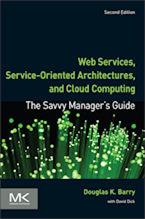Using JDBC with Application Servers
JDBC is generally considered the most common way people expect to provide persistence to the J2EE application server platform. For more information on the JDBC application program interface, see JDBC.
Be sure to take a look at transparent persistence vs. JDBC call-level interface. This outlines some disadvantages of using JDBC that you should consider when designing persistence for J2EE.
See When to Use JDBC with Java Application Servers.
Also, be sure to check out how JDBC can be part of integrated J2EE Architecture Solutions.
Using JDBC, as shown in this diagram, will require data conversion in either the application server or in the applications. See JDBC Data Conversion.

Context for Using JDBC with Application Servers
Related Articles for Using JDBC with Application Servers
The Savvy Manager's Guide
Douglas K Barry is also the author of a book that explains Web Services, service-oriented architecture, and Cloud Computing in an easy-to-understand, non-technical manner.
Web Services, Service-Oriented Architectures, and Cloud Computing: The Savvy Manager's Guide (Second Edition)
by Douglas K Barry with David Dick
This is a guide for the savvy manager who wants to capitalize on the wave of change that is occurring with Web Services, service-oriented architecture, and—more recently—Cloud Computing. The changes wrought by these technologies will require both a basic grasp of the technologies and an effective way to deal with how these changes will affect the people who build and use the systems in our organizations. This book covers both issues. Managers at all levels of all organizations must be aware of both the changes that we are now seeing and ways to deal with issues created by those changes.

